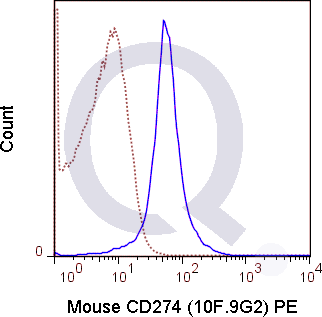Mouse Anti-Anti-CD274 Antibody Product Attributes
Species: Mouse
Tested Applications: Flow Cytometry.
Application Notes: See Product Datasheet for Recommended Dilution Range. Requires Experimental Optimization
Clonality: Monoclonal Antibody
Anti-Anti-CD274 Antibody Clone: 10F.9G2
Clone 10F.9G2 Host and Isotype: Rat IgG2b kappa
Buffer and Stabilizer: 10 mM NaH2PO4, 150 mM NaCl, 0.09% NaN3, 0.1% gelatin, pH7.2
Antibody Concentration: 0.2 mg/mL
Storage Conditions: 2-8C protected from light. Stable for 12 Months. Do Not Freeze.
Anti-CD274 Previously Observed Antibody Staining Patterns
Observed Subcellular, Organelle Specific Staining Data:
Staining with anti-PD-L1 / B7-H1 / CD274 antibody reveals PD-L1 / B7-H1 / CD274 expression is expected to be primarily localized to the cytosol.
| Anti-CD274 General Information | |
|---|---|
| Alternate Names | |
| PD-L1, B7-H1, CD274, A5345L16Rik, Pdcd1l1, Pdl1, B7h1, Pdcd1lg1 | |
| Curated Database and Bioinformatic Data | |
| Gene Symbol | Cd274 |
| Entrez Gene ID | 60533 |
| Ensemble Gene ID | ENSMUSG00000016496 |
| RefSeq Protein Accession(s) | NP_068693 |
| RefSeq mRNA Accession(s) | NM_021893 |
| RefSeq Genomic Accession(s) | NC_000085 |
| UniProt ID(s) | Q3U472, Q9EP73 |
| UniGene ID(s) | Q3U472, Q9EP73 |
| Cosmic ID(s) | Cd274 |
| KEGG Gene ID(s) | mmu:60533 |
| General Description of Anti-CD274. | |
| The 10F.9G2 antibody is specific for mouse CD274, more commonly known as PD-L1 or B7-H1, which acts as a ligand for the T cell co-regulatory receptor PD-1 (CD279). This interaction modulates T cell antigen receptor (TCR) signaling and therefore T cell activation. PD-L1 binding to PD-1 expressed on CD4- CD8- thymocytes participates in the processes of clonal selection, elimination of autoreactive lymphocytes, and development of tolerance. PD-L1 may also bind PD-1 following the receptors inducible expression on activated, mature T cells, where it has been proposed to limit T cell activation. PD-L1 is one of a group of B7 ligands whose interactions with the CD28 receptor family, also including CTLA-4 (CD152), provide a balance of co-stimulatory /co-inhibitory signaling important in T cell activation, tolerance, and autoimmunity.The 10F.9G2 antibody may be used as a marker for PD-L1 expression on T and B cells, NK cells and on dendritic cells. It is also widely used for analysis of receptor-ligand interaction and function(s) in vitro and in vivo. | |
Selected References
Chen A, Ahlen G, Brenndorfer ED, Brass A, Holmstrom F, Chen M, Soderholm J, Milich DR, Frelin L, and Sallberg M. 2011. J. Immunol. 186:5107-5118. (in vivo depletion)Zhang L, Gajewski TF, and Kline J. 2009. Blood. 114:1545-1552. (in vivo blocking)Rivas MN, Weatherly K, Hazzan M, Vokaer B, Dremier S, Gaudray F, Goldman M, Salmon I, and Braun MY. 2009. 183:4284-4291. (in vitro blocking)Brooks DG, Ha S-J, Elsaesser H, Sharpe AH, Freeman GJ, and Oldstone MBA. 2008. Proc. Natl. Acad. Sci. 105:20428-20433. (in vivo blocking)Koehn BH, Ford ML, Ferrer IR, Borom K, Gangappa S, Kirk AD, and Larsen CP. 2008. J. Immunol. 181:5313-5322. (in vivo blocking)
Limitations and Warranty
enQuire Bio’s Mouse Anti-CD274 / PD-L1 Monoclonal is available for Research Use Only. This antibody is guaranteed to work for a period of two years when properly stored.




There are no reviews yet.